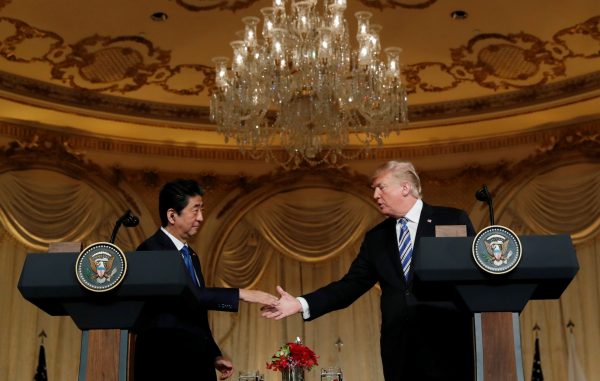Two issues loomed particularly large during the summit, the first of which was North Korea. Tokyo received with great surprise the announcement on 8 March that Trump will meet with North Korean leader Kim Jong-un. On the one hand, Abe would have wanted to remind Trump of Japan’s steadfast support for the United States’ ultimate goal of denuclearising North Korea. On the other hand, Abe also needed to articulate that he should be consulted before Trump reaches any agreement with Kim on denuclearisation. From the Japanese perspective, any US–North Korea agreement must address the threat to the region posed by North Korea’s short- and medium-range missiles. North Korean abductions of Japanese citizens is another issue that Abe cannot overlook.
The other issue that loomed large was trade. The comprehensive economic dialogue supposedly co-chaired by US Vice President Mike Pence and Japanese Deputy Prime Minister Taro Aso has not made any noticeable headway since it was launched. Meanwhile, Trump has imposed a 25 per cent tariff on steel and aluminium imported to the United States. While many major US allies — such as Canada and the European Union — are exempt from this measure, Japan is not. During the summit, Abe would have wanted to leverage his close personal relationship with Trump to convince him that Japan ought to be exempt as well.
Abe would have also liked to discuss how Japan might be able to help the United States return to the Trans-Pacific Partnership (TPP) without losing face. Given that Trump signalled prior to the summit that he might reconsider his withdrawal of the United States from the TPP, a conversation on the possibility of the United States’ return to the agreement would have been a major achievement for Abe.
Yet when everything was said and done, Abe faced the sober reality that Trump — while friendly to Abe in his personal interactions — does not seem to mind putting Japan in awkward positions. On trade, not only was Abe unsuccessful in reversing Trump’s decision to lay down a tariff on Japanese steel and aluminium exports, but Abe also ended up agreeing to launch a new round of negotiations to reach a bilateral agreement on ‘free, fair and reciprocal’ trade between the two countries. The talks will be led by US Trade Representative Robert Lighthizer and the Japanese Minister of Economy, Trade and Industry Toshimitsu Motegi. They may well lay the foundations for the negotiation of a US–Japan bilateral free trade agreement, despite Abe’s refusal to admit this.
Even on the issue of North Korea, Abe extracted from Trump only his verbal commitment that he would ‘raise’ the abduction issue in his meeting with Kim Jong-un. It remains uncertain how strongly Trump will insist that North Korea seriously address this issue, along with Japan’s other security concerns, if it wants to reach a deal with the United States. Despite Trump’s verbal commitment, the abduction problem is a bilateral issue between Japan and North Korea. Trump is unlikely to prioritise it when he meets Kim.
Japan can only play a limited role in the negotiations towards a peace agreement to formally end the Korean War, since it is not a party to the war’s ceasefire. Although Japan and China have begun to mend their relationship, Tokyo’s tense relationship with Seoul will likely make it difficult for Japan to be included meaningfully. Unfortunately for Abe, very few people seem to know what Trump means when he says he is pushing for a ‘comprehensive agreement’ with North Korea — particularly in light of Kim Jong-un’s unilateral declaration that North Korea will suspend nuclear and missile tests prior to his meeting with Trump. No one knows what Kim might demand in return for his ‘good behaviour’, let alone whether he is serious about eliminating his nuclear weapons.
Maintaining close contact with the United States is critical if Japan does not want to be isolated from the developments on the Korean Peninsula. But Abe’s summit with Trump clearly reminded Japan that its capacity to influence talks between the parties of the armistice agreement — the United States, China, South Korea and North Korea — is extremely limited. Such limitations cannot be overcome even by a close personal relationship between Trump and Abe.
Abe was once considered to be one of the few world leaders that knew how to work with Trump. But their summit suggested that Abe may no longer have that advantage. Despite personal rapport between Trump and Abe, US–Japan relations under the Trump administration have moved beyond the honeymoon phase.
Yuki Tatsumi is Co-Director of the East Asia Program and Director of the Japan Program at the Stimson Center in Washington, DC. She also concurrently serves as non-resident Senior Fellow at the Canon Institute for Global Studies in Tokyo.


Many of us who live in the US and thus have more exposure to Trump’s interactional style knew from the start that Abe’s so called ‘personal rapport’ with the President was being over estimated. Trump does not engage in ongoing reciprocal relationships with anyone. Abe is naive to think, or hope,otherwise.
Some have called Trump’s style ‘transactional.’ Ie, that he looks at situations and people only in terms of give and take. Others have called him narcissistic. Ie, that he only looks for what is in it for him. And others have called him impulsive, if not poorly organized or even chaotic. Ie, he does whatever strikes his fancy at the moment.
Take your choice. Any of these options mean that Abe, or any other head of state, cannot rely on Trump for much consistency let alone reciprocity.